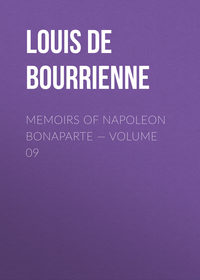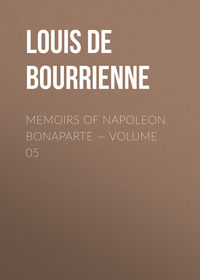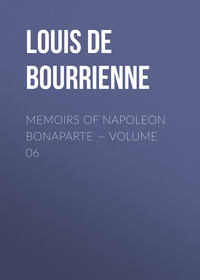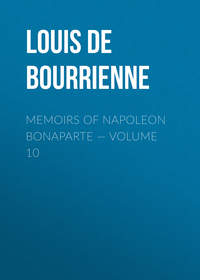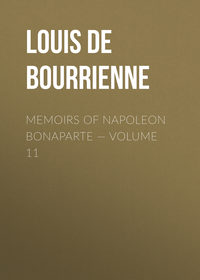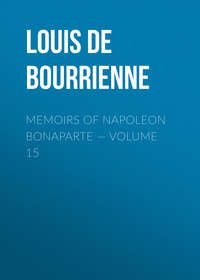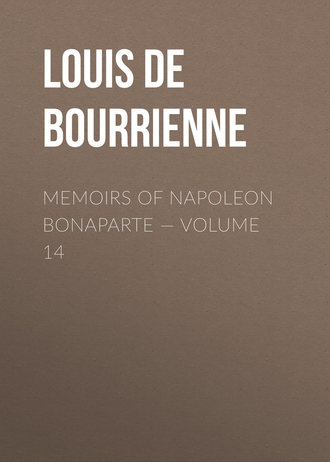 полная версия
полная версияMemoirs of Napoleon Bonaparte — Volume 14
"The next day the Emperor spoke to me of the previous night's conversation. 'I suspected,' he said, 'that the wretch was in correspondence with Vienna. I have had a banker's clerk arrested on his return from that city. He has acknowledged that he brought a letter for Fouche from Metternich, and that the answer was to be sent at a fixed time to Bale, where a man was to wait for the bearer on the bridge: I sent for Fouche a few days ago, and kept him three hours long in my garden, hoping that in the course of a friendly conversation he would mention that letter to me, but he said nothing. At last, yesterday evening, I myself opened the subject.' (Here the Emperor repeated to me the words I had heard the night before, 'You are a traitor,' etc.) He acknowledged, in fact, continued the Emperor, 'that he had received such a letter, but that it was not signed and that he had looked upon it as a mystification. He showed it me. Now that letter was evidently an answer, in which the writer again declared that he would listen to nothing more concerning the Emperor, but that, his person excepted, it would be easy to agree to all the rest. I expected that the Emperor would conclude his narrative by expressing his anger against Fouche, but our conversation turned on some other subject, and he talked no more of him.
"Two days afterwards I went to Fouche to solicit the return to Paris of an officer of musqueteers who had been banished far from his family. I found him at breakfast, and sat down next to him. Facing him sat a stranger. 'Do you see this man?' he said to me; pointing with his spoon to the stranger; 'he is an aristocrat, a Bourbonist, a Chouan; it is the Abbe ——-, one of the editors of the Journal des Debats—a sworn enemy to Napoleon, a fanatic partisan of the Bourbons; he is one of our men. I looked, at him. At every fresh epithet of the Minister the Abbe bowed his head down to his plate with a smile of cheerfulness and self- complacency, and with a sort of leer. I never saw a more ignoble countenance. Fouche explained to me, on leaving the breakfast table, in what manner all these valets of literature were men of his, and while I acknowledged to myself that the system might be necessary, I scarcely knew who were really more despicable—the wretches who thus sold themselves to the highest bidder, or the minister who boasted of having bought them, as if their acquisition were a glorious conquest. Judging that the Emperor had spoken to me of the scene I have described above, Fouche said to me, 'The Emperor's temper is soured by the resistance he finds, and he thinks it is my fault. He does not know that I have no power but by public opinion. To morrow I might hang before my door twenty persons obnoxious to public opinion, though I should not be able to imprison for four-and-twenty hours any individual favoured by it. As I am never in a hurry to speak I remained silent, but reflecting on what the Emperor had said concerning Fouche I found the comparison of their two speeches remarkable. The master could have his minister hanged with public applause, and the minister could hang—whom? Perhaps the master himself, and with the same approbation. What a singular situation!—and I believe they were both in the right; so far public opinion, equitable in regard to Fouche, had swerved concerning the Emperor."
The wrath of Napoleon was confined to the Lower House, the Peers, from the nature of their composition, being complacent and passive enough. The vast majority of them were in fact mere shadows gathered round the solid persons of Joseph, Lucien, Louis, and Jerome Bonaparte, and Sieyes, Carnot, and the military men of the Revolution. As a political body Napoleon despised them himself, and yet he wanted the nation to respect them. But respect was impossible, and the volatile Parisians made the Peers a constant object of their witticisms. The punsters of Paris made the following somewhat ingenious play upon words. Lallemand, Labedogure, Drouot, and Ney they called Las Quatre Pairs fides (perfides), which in pronunciation may equally mean the four faithful peers or the four perfidious men. The infamous Vandamme and another were called Pair- siffles, the biased peers, or the biased pair, or (persiffles) men made objects of derision. It was thus the lower orders behaved while the, existence of France was at stake.
By this time the thunder-cloud of war had gathered and was ready to burst. Short as the time at his disposal was Napoleon prepared to meet it with his accustomed energy. Firearms formed one of the most important objects of attention. There were sufficient sabres, but muskets were wanting. The Imperial factories could, in ordinary times, furnish monthly 20,000 stands of new arms; by the extraordinary activity and inducements offered this number was doubled. Workmen were also employed in repairing the old muskets. There was displayed at this momentous period the same activity in the capital as in 1793, and better directed, though without the same ultimate success. The clothing of the army was another difficulty, and this was got over by advancing large sums of money to the cloth manufacturers beforehand. The contractors delivered 20,000 cavalry horses before the 1st of June, 10,000 trained horses had been furnished by the dismounted gendarmerie. Twelve thousand artillery horses were also delivered by the 1st of June, in addition to 6000 which the army already had.
The facility with which the Ministers of Finance and of the Treasury provided for all these expenses astonished everybody, as it was necessary to pay for everything in ready money. The system of public works was at the same time resumed throughout France. "It is easy to see," said the workmen, "that 'the great contractor' is returned; all was dead, now everything revives."
"We have just learnt," says a writer who was at Brussels at this time, "that Napoleon had left the capital of France on the 12th; on the 15th the frequent arrival of couriers excited extreme anxiety, and towards evening General Muffing presented himself at the hotel of the Duke of Wellington with despatches from Blucher. We were all aware that the enemy was in movement, and the ignorant could not solve the enigma of the Duke going tranquilly to the ball at the Duke of Richmond's—his coolness was above their comprehension. Had he remained at his own hotel a panic would have probably ensued amongst the inhabitants, which would have embarrassed the intended movement of the British division of the army.
"I returned home late, and we were still talking over our uneasiness when we heard the trumpets sound. Before the sun had risen in full splendour I heard martial music approaching, and soon beheld from my windows the 5th reserve of the British army passing; the Highland brigade were the first in advance, led by their noble thanes, the bagpipes playing their several pibrochs; they were succeeded by the 28th, their bugles' note falling more blithely upon the ear. Each regiment passed in succession with its band playing."
The gallant Duke of Brunswick was at a ball at the assembly-rooms in the Rue Ducale on the night of the 15th of June when the French guns, which he was one of the first to hear, were clearly distinguished at Brussels. "Upon receiving the information that a powerful French force was advancing in the direction of Charleroi. 'Then it is high time for me to be off,' he exclaimed, and immediately quitted, the ball-room."
"At four the whole disposable force under the Duke off Wellington was collected together, but in such haste that many of the officers had no time to change their silk stockings and dancing-shoes; and some, quite overcome by drowsiness, were seen lying asleep about the ramparts, still holding, however, with a firm hand, the reins of their horses, which were grazing by their sides.
"About five o'clock the word march' was heard in ail directions, and instantly the whole mass appeared to move simultaneously. I conversed with several of the officers previous to their departure, and not one appeared to have the slightest idea of an approaching engagement.
"The Duke of Wellington and his staff did not quit Brussels till past eleven o'clock, and it was not till some time after they were gone that it was generally known the whole French army, including a strong corps of cavalry, was within a few miles of Quatre Bras."
CHAPTER VIII
—[Like the preceding, this chapter first appeared in the 1836 edition, and is not from the pen of M. de Bourrienne.]—
1815.
THE BATTLES OF LIGNY AND QUATRE BRASThe moment for striking a decisive blow had now come, and accordingly, early on the morning of the 15th, the whole of the French army was in motion. The 2d corps proceeded to Marchiennes to attack the Prussian outposts at Thuin and Lobes, in order to secure the communication across the Sambre between those places. The 3d corps, covered by General Pajol's cavalry, advanced upon Charleroi, followed by the Imperial Guard and the 6th corps, with the necessary detachments of pontoniers. The remainder of the cavalry, under Grouchy, also advanced upon Charleroi, on the flanks of the 3d and 6th corps. The 4th corps was ordered to march upon the bridge of Chatelet.
On the approach of the French advanced guards an incessant skirmish was maintained during the whole morning with the Prussians, who, after losing many men, were compelled to yield to superior numbers. General Zieten, finding it impossible, from the extent of frontier he had to cover, to cheek the advance of the French, fell back towards Fleurus by the road to Charleroi, resolutely contesting the advance of the enemy wherever it was possible. In the repeated attacks sustained by him he suffered considerable loss. It was nearly mid-day before a passage through Charleroi was secured by the French army, and General Zieten continued his retreat upon Fleurus, where he took up his position for the night. Upon Zieten's abandoning, in the course of his retreat, the chaussee which leads to Brussels through Quatre Bras, Marshal Ney, who had only just been put in command on the left of the French army, was ordered to advance by this road upon Gosselies, and found at Frasnes part of the Duke of Wellington's army, composed of Nassau troops under the command of Prince Bernard of Saxe-Weimar, who, after some skirmishing, maintained his position. "Notwithstanding all the exertions of the French at a moment when time was of such importance, they had only been able to advance about fifteen English miles during the day, with nearly fifteen hours of daylight."
It was the intention of Napoleon during his operations on this day to effect a separation between the English and Prussian armies, in which he had nearly succeeded. Napoleon's plan for this purpose, and the execution of it by his army, were alike admirable, but it is hardly probable that the Allied generals were taken by surprise, as it was the only likely course which Napoleon could have taken. His line of operation was on the direct road to Brussels, and there were no fortified works to impede his progress, while from the nature of the country his numerous and excellent cavalry could be employed with great effect.
In the French accounts Marshal Ney was much blamed for not occupying Quatre Bras with the whole of his force on the evening of the 16th. "Ney might probably have driven back the Nassau troops at Quatre Bras, and occupied that important position, but hearing a heavy cannonade on his right flank, where General Zieten had taken up his position, he thought it necessary to halt and detach a division in the direction of Fleurus. He was severely censured by Napoleon for not having literally followed his orders and pushed on to Quatre Bras." This accusation forms a curious contrast with that made against Grouchy, upon whom Napoleon threw the blame of the defeat at Waterloo, because he strictly fulfilled his orders, by pressing the Prussians at Wavre, unheeding the cannonade on his left, which might have led him to conjecture that the more important contest between the Emperor and Wellington was at that moment raging.
It was at six o'clock in the evening of the 16th that the Drake of Wellington received the first information of the advance of the French army; but it was not, however, until ten o'clock that positive news reached him that the French army had moved upon the line of the Sambre. This information induced him to push forward reinforcements on Quatre Bras, at which place he himself arrived at an early hour on the 16th, and immediately proceeded to Bry, to devise measures with Marshal Blucher in order to combine their efforts. From the movement of considerable masses of the French in front of the Prussians it was evident that their first grand attack would be directed against them. That this was Napoleon's object on the 16th maybe seen by his orders to Ney and Grouchy to turn the right of the Prussians, and drive the British from their position at Quatre Bras, and then to march down the chaussee upon Bry in order effectually to separate the two armies. Ney was accordingly detached for this purpose with 43,000 men. In the event of the success of Marshal Ney he would have been enabled to detach a portion of his forces for the purpose of making a flank attack upon the Prussians in the rear of St. Amend, whilst Napoleon in person was directing his main efforts against that village the strongest in the Prussian position. Ney's reserve was at Frasnes, disposable either for the purpose of supporting the attack on Quatre Bras or that at St. Amand; and in case of Ney's complete success to turn the Prussian right flank by marching on Bry.
CHAPTER IX
1815
THE BATTLE OF WATERLOOOne of the most important struggles of modern times was now about to commence—a struggle which for many years was to decide the fate of Europe. Napoleon and Wellington at length stood opposite one another. They had never met; the military reputation of each was of the highest kind,
—[For full details of the Waterloo campaign see Siborne's History of the War in France and Belgium in 1815, giving the English contemporary account; Chesney's Waterloo Lectures, the best English modern account, which has been accepted by the Prussians as pretty nearly representing their view; and Waterloo by Lieutenant-Colonel Prince Edouard de la Tour d'Auvergne (Paris, Plon, 1870), which may be taken as the French modern account.
In judging this campaign the reader must guard himself from looking on it as fought by two different armies-the English and the Prussian-whose achievements are to be weighed against one another. Wellington and Blucher were acting in a complete unison rare even when two different corps of the same nation are concerned, but practically unexampled in the case of two armies of different nations. Thus the two forces became one army, divided into two wings, one, the left (or Prussian wing) having been defeated by the main body of the French at Ligny on the 16th of June, the right (or English wing) retreated to hold the position at Waterloo, where the left (or Prussian wing) was to join it, and the united force was to crash the enemy. Thus there is no question as to whether the Prussian army saved the English by their arrival, or whether the English saved the Prussians by their resistance at Waterloo. Each army executed well and gallantly its part in a concerted operation. The English would never have fought at Waterloo if they had not relied on the arrival of the Prussians. Had the Prussians not come up on the afternoon of the 18th of June the English would have been exposed to the same great peril of having alone to deal with the mass of the French army, as the Prussians would have had to face if they had found the English in full retreat. To investigate the relative performances of the two armies is lunch the same as to decide the respective merits of the two Prussian armies at Sadowa, where one held the Austrians until the other arrived. Also in reading the many interesting personal accounts of the campaign it most be remembered that opinions about the chance of success in a defensive struggle are apt to warp with the observer's position, as indeed General Grant has remarked in answer to criticisms on his army's state at the end of the first day of the battle of Shiloh or 'Pittsburg Landing. The man placed in the front rank or fighting line sees attack after attack beaten off. He sees only part of his own losses, am most of the wounded disappear, and he also knows something of the enemy's loss by seeing the dead in front of him. Warmed by the contest, he thus believes in success. The man placed in rear or advancing with reinforcements, having nothing of the excitement of the struggle, sees only the long and increasing column of wounded, stragglers, and perhaps of fliers. He sees his companion fall without being able to answer the fire. He sees nothing of the corresponding loss of the enemy, and he is apt to take a most desponding view of the situation. Thus Englishmen reading the accounts of men who fought at Waterloo are too ready to disbelieve representations of what was taking place in the rear of the army, and to think Thackeray's life-like picture in Vanity Fair of the state of Brussels must be overdrawn. Indeed, in this very battle of Waterloo, Zieten began to retreat when his help was most required, because one of his aides de camp told him that the right wing of the English was in full retreat. "This inexperienced young man," says Muffling, p. 248, "had mistaken the great number of wounded going, or being taken, to the rear to be dressed, for fugitives, and accordingly made a false report." Further, reserves do not say much of their part or, sometimes, no part of the fight, and few people know that at least two English regiments actually present on the field of Waterloo hardly fired a shot till the last advance.
The Duke described the army as the worst he ever commanded, and said that if he had had his Peninsular men, the fight would have been over much sooner. But the Duke, sticking to ideas now obsolete, had no picked corps. Each man, trusting in and trusted by his comrades, fought under his own officers and under his own regimental colours. Whatever they did not know, the men knew how to die, and at the end of the day a heap of dead told where each regiment and battery had stood.]—
the career of both had been marked by signal victory; Napoleon had carried his triumphant legions across the stupendous Alps, over the north of Italy, throughout Prussia, Austria, Russia, and even to the foot of the Pyramids, while Wellington, who had been early distinguished in India, had won immortal renown in the Peninsula, where he had defeated, one after another, the favourite generals of Napoleon. He was now to make trial of his prowess against their Master.
Among the most critical events of modern times the battle of Waterloo stands conspicuous. This sanguinary encounter at last stopped the torrent of the ruthless and predatory ambition of the French, by which so many countries had been desolated. With the peace which immediately succeeded it confidence was restored to Europe.
CHAPTER X
1815
Interview with Lavallette—Proceedings in the French Chambers— Second abdication of Napoleon—He retires to Rochefort, negotiates with Captain Maitland, and finally embarks in the 'Bellerophon'.
One of the first public men to see Napoleon after his return from Waterloo was Lavallette. "I flew," says he, "to the Elysee to see the Emperor: he summoned me into his closet, and as soon as he saw me, he came to meet me with a frightful epileptic 'laugh. `Oh, my God!' he said, raising his eyes to heaven, and walking two or three times up and down the room. This appearance of despair was however very short. He soon recovered his coolness, and asked me what was going forward in the Chamber of Representatives. I could not attempt to hide that party spirit was there carried to a high pitch, and that the majority seemed determined to require his abdication, and to pronounce it themselves if he did not concede willingly. 'How is that?' he said. 'If proper measures are not taken the enemy will be before the gates of Paris in eight days. Alas!' he added, 'have I accustomed them to such great victories that they knew not how to bear one day's misfortune? What will become of poor France? I have done all I could for her!' He then heaved a deep sigh. Somebody asked to speak to him, and I left him, with a direction to come back at a later hour.
"I passed the day in seeking information among all my friends and acquaintances. I found in all of them either the greatest dejection or an extravagant joy, which they disguised by feigned alarm and pity for myself, which I repulsed with great indignation. Nothing favourable was to be expected from the Chamber of Representatives. They all said they wished for liberty, but, between two enemies who appeared ready to destroy it, they preferred the foreigners, the friends of the Bourbons, to Napoleon, who might still have prolonged the struggle, but that he alone would not find means to save them and erect the edifice of liberty. The Chamber of Peers presented a much sadder spectacle. Except the intrepid Thibaudeau, who till, the last moment expressed himself with admirable energy against the Bourbons, almost all the others thought of nothing else but getting out of the dilemma with the least loss they could. Some took no pains to hide their wish of bending again under the Bourbon yoke."
On the evening of Napoleon's return to Paris he sent for Benjamin Constant to come to him at the Elysee about seven o'clock. The Chambers had decreed their permanence, and proposals for abdication had reached the Emperor. He was serious but calm. In reply to some words on the disaster of Waterloo he said, "The question no longer concerns me, but France. They wish me to abdicate. Have they calculated upon the inevitable consequences of this abdication? It is round me, round my name, that the army rallies: to separate me from it is to disband it. If I abdicate to-day, in two days' time you will no longer have an army. These poor fellows do not understand all your subtleties. Is it believed that axioms in metaphysics, declarations of right, harangues from the tribune, will put a stop to the disbanding of an army? To reject me when I landed at Cannes I can conceive possible; to abandon me now is what I do not understand. It is not when the enemy is at twenty-five leagues' distance that any Government can be overturned with impunity. Does any one imagine that the Foreign Powers will be won over by fine words? If they had dethroned me fifteen days ago there would have been some spirit in it; but as it is, I make part of what strangers attack, I make part, then, of what France is bound to defend. In giving me up she gives up herself, she avows her weakness, she acknowledges herself conquered, she courts the insolence of the conqueror. It is not the love of liberty which deposes me, but Waterloo; it is fear, and a fear of which your enemies will take advantage. And then what title has the Chamber to demand my abdication? It goes out of its lawful sphere in doing so; it has no authority. It is my right, it is my duty to dissolve it."
"He then hastily ran over the possible consequences of such a step. Separated from the Chambers, he could only be considered as a military chief: but the army would be for him; that would always join him who can lead it against foreign banners, and to this might be added all that part of the population which is equally powerful and easily, led in such a state of things. As if chance intended to strengthen Napoleon in this train of thought, while he was speaking the avenue of Marigny resounded with the cries of 'Vive l'Empereur!' A crowd of men, chiefly of the poor and labouring class, pressed forward into the avenue, full of wild enthusiasm, and trying to scale the walls to make an offer to Napoleon to rally round and defend him. Bonaparte for some time looked attentively at this group. 'You see it is so,' said he; "those are not the men whom I have loaded with honours and riches. What do these people owe me? I found them—I left them—poor. The instinct of necessity enlightens them; the voice of the country speaks by their months; and if I choose, if I permit it, in an hour the refractory Chambers will have ceased to exist. But the life of a man is not worth purchasing at such a price: I did not return from the Isle of Elba that Paris should be inundated with blood: He did not like the idea of flight. 'Why should I not stay here?' he repeated. 'What do you suppose they would do to a man disarmed like me? I will go to Malmaison: I can live there in retirement with some friends, who most certainly will come to see me only for my own sake.'


